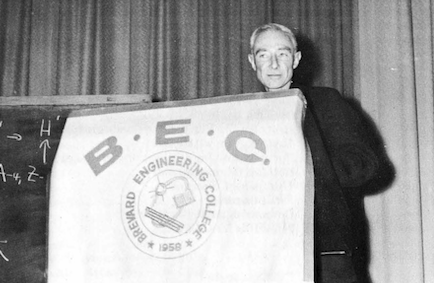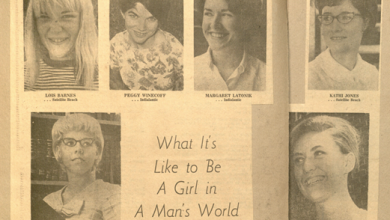Secret History: J. Robert Oppenheimer Comes to ‘Countdown College’
Dateline: Jan. 19, 1965

The emaciated, old man stood between Florida Tech president Jerome “Jerry” Keuper and Joe Boyd, CEO of Radiation Inc., at what was then the Patrick Air Force Base Theater. Keuper, a nuclear physicist, had invited J. Robert Oppenheimer to come to Florida to lecture in the Brevard Engineering College (BEC)—today, Florida Tech—Science Seminar series.
In a “tremulous yet resolute” voice, the “father of the atomic bomb” spoke about the “miserable things,” his euphemism for the atomic and hydrogen bombs. A decade earlier, the Atomic Energy Commission (AEC) had stripped Oppenheimer of his security clearance. Eleven years had done little to assuage the pain caused by this assault on his loyalty.

Oppenheimer spoke about his “old friend” Niels Bohr. In 1943, the Danish underground and the British secret service organized Bohr’s escape from Nazi-occupied Denmark. Late one September night, Bohr climbed into a small boat and crossed the Oresund (the Sound) separating Denmark and Sweden. Three weeks later, Bohr was flown to England in the bomb bay of a de Havilland Mosquito. Bohr was given earplugs, a headset and an oxygen mask. When the RAF airmen opened the bomb bay, they were horrified to discover Bohr was unconscious. Apparently, the individual who had won the Nobel Prize in 1922 for his investigations of the structure of the atom had proven inept in adjusting his oxygen mask. Fortunately, he recovered.

Oppenheimer revealed that in 1945, then British prime minister Winston Churchill and U.S. president Franklin Roosevelt worried that Bohr might reveal to the Soviet Union the countries’ work on the Manhattan Project. They were, Oppenheimer maintained, mistaken.
Bohr knew that “the bomb would change the world.” He feared that unless the U.K. and the U.S. informed the Soviets, the Manhattan Project would “initiate an arms race” that could lead to World War III.
Earlier, Bohr had written to Roosevelt expressing his concerns. If the Soviets were forewarned of the bomb “in an aura of friendliness,” Bohr thought this “responsible action” might save the world from nuclear Armageddon. Oppenheimer told the BEC students and faculty that Bohr’s action “was a noble failure.”

Keuper drove to Oppenheimer’s motel in his 1952 MG the next morning. Countdown College’s president gave Oppenheimer a quick tour of Melbourne, followed by breakfast at the Clock Restaurant on U.S. Route 1. Later, Oppenheimer visited Kennedy Space Center.
Keuper hoped Oppenheimer would return for an extended visit to the Space Coast, but that did not come to pass. A few weeks later, Oppenheimer, a chain-smoker, was diagnosed with throat cancer. Two years later, he slipped into a coma, dying Feb. 18, 1967. Before his death, Oppenheimer reflected on the security hearing.
“The whole damn thing was a farce.”
On July 19, 1945, three days after the first atomic test, Oppenheimer wrote what might have served as his obituary:
“In sleep, in confusion, in the depths of shame, The good deeds a man has done before defend him.”
Note: On December 16, 2022, Jennifer Granholm, the U.S. secretary of energy, declared, “As time has passed, more evidence has come to light of the bias and unfairness of the process Dr. Oppenheimer was subjected to while the evidence of his loyalty and love of country have only been affirmed.” Granholm ordered that the revocation of Oppenheimer’s security clearance be vacated.
Christopher Nolan’s 2023 film, “Oppenheimer,” based on Kai Bird and Martin J. Sherwin’s American Prometheus (2006), has aroused new interest in J. Robert Oppenheimer.






